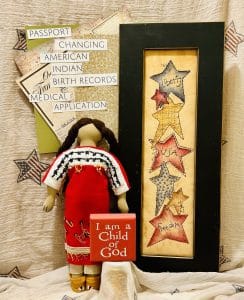Hebrew Residential School in Babylon
The Book of Daniel begins with the nation of Babylon raiding Jerusalem (Daniel 1:1) and the Babylonian king, Nebuchadnezzar, beginning a new program to educate captured Hebrew children.
3 ¶ And the king spake unto Ashpenaz athe master of his eunuchs, that he should bring certain of the children of Israel, and of the king’s bseed, and of the princes;
4 Children in whom was no blemish, but awell favoured, and skilful in all wisdom, and cunning in knowledge, and understanding science, and such as had ability in them to stand in the king’s palace, and whom they might teach the learning and the tongue of the Chaldeans.
5 And the king appointed them a daily aprovision of the king’s bmeat, and of the wine which he drank: so nourishing them three years, that at the end thereof they might cstand before the king.
Daniel 1:3-5
- What do you think of King Nebuchadnezzar’s plan?
- What might be the motives behind such a program?
The protagonists in the Book of Daniel are four of these captured Hebrew children.
6 Now among these were of the children of Judah, Daniel, Hananiah, Mishael, and Azariah:
7 Unto whom the prince of the eunuchs gave names: for he gave unto Daniel the name of Belteshazzar; and to Hananiah, of Shadrach; and to Mishael, of Meshach; and to Azariah, of Abed-nego.Daniel 1:6-7
Modern readers tend to call Daniel by his Hebrew name but call Hananiah, Mishael, and Azariah by their Babylonian names. Throughout this lesson plan, I will call all four by their original Hebrew names rather than using names assigned to them by their captors.

While living in captivity, these young men lived in luxury compared to many of their enslaved peers, but they still experienced repeated threats to their lives and ongoing efforts to force them to assimilate to the Babylonian religion and culture.
Invite class members to choose one of these three scripture stories to silently read. As they read, invite them to consider the kinds of challenges Daniel, Hananiah, Mishael, and Azariah experienced and how they responded.
- The king requires Hebrew children to consume foods and drinks that are against their dietary codes: Daniel 1:8-15
- The king threatens to kill all wise men, including Hebrew wise men, because no one can interpret the dream he has forgotten: Daniel 2:1-5, 12-23
- The king bans worship of God for 30 days. The penalty for noncompliance is to be tossed into a lion’s den: Daniel 6:3-23
Invite class members to share what they learned after silent reading time.
- Why would it have been hard to be faithful in these situations?
- What strategies did they empty to help them cope with these challenges and maintain their Hebrew identities?
- What situations do we face that challenge our faith?
- How can we follow the examples of Daniel, Hananiah, Mishael, and Azariah?
We see Babylon in our cities; we see Babylon in our communities; we see Babylon everywhere. And with the encroachment of Babylon, we have to create Zion in the midst of it. We should not allow ourselves to be engulfed by the culture which surrounds us. We seldom realize the extent to which we are a product of the culture of our place and time.
…Daniel and his brothers refused to do that which they believed to be wrong, however much the Babylonian culture believed it to be right. And for that fidelity and courage, the Lord blessed them and “gave them knowledge and skill in all learning and wisdom” (Dan. 1:17).
Wherever we are, whatever city we may live in, we can build our own Zion by the principles of the celestial kingdom and ever seek to become the pure in heart. Zion is the beautiful, and the Lord holds it in His own hands. Our homes can be places which are a refuge and protection, as Zion is. We do not need to become as puppets in the hands of the culture of the place and time. We can be courageous and can walk in the Lord’s paths and follow His footsteps. And if we do, we will be called Zion, and we will be the people of the Lord.
—David R. Stone, Quorum of the Seventy, Zion in the Midst of Babylon, April 2006
- What is the danger of becoming a product of the culture that surrounds us?
- How can we build our own Zion?
While Babylonian rulers may have believed Hebrew children needed their instruction, the scriptures indicate that the true source of knowledge for these children was God.
17 ¶ As for these four children, God gave them knowledge and skill in all learning and wisdom: and Daniel had understanding in all visions and dreams.
Daniel 1:17
- Do we sometimes credit ourselves for God’s work? How can we develop humility to recognize God’s hand?
- How can we learn to see godliness in other people, including those from different religions and cultures than ourselves?
The dynamics of the story are resonant for women, ethnic minorities, and other outsiders who have ever been invited to enter an institution of power formerly closed to them. Like the exiled Jewish captives, women and ethnic minorities appear in such contexts marked with associations of powerlessness. The institution, whether a church, a corporation, or other such organization, often sees itself simply and wholly as the powerful one, benevolently providing access to power to those previously excluded. It often cannot imagine that those whom it sees as in need of patronage may in fact be the bearers of resources of power that the institution neither creates nor controls, but which it may someday desperately need, as Nebuchadnezzar eventually learns (Dan. 2 and 4).
—Carol A. Newsom, Daniel, Women’s Bible Commentary by Carol A. Newsom, Sharon H. Ringe and Jacqueline E. Lapsley
- Why do we sometimes fail to see what those who are less privileged or empowered have to offer?
- How can we be more inclusive?
Indian Residential School in North America
Although the rulers of Babylon are the antagonists in this story and the captured Hebrew children are the heroes, in more recent history, Christians in the United States and Canada have followed the example of Babylon in their treatment of indigenous children. Indian Residential School programs in Canada and the United States removed indigenous children from their homes, sometimes forcibly, in an attempt to assimilate them to Anglo/Christian culture.
Share one of the following videos to learn more about this history:
Residential Schools, the Canadian Encyclopedia
Tragic Legacy: the Unknown Stories, Indian Residential School Program, WGRZ news
- Why would modern Christians create a program so similar to one created by Babylon in the Bible?
- How can we guard against such misguided efforts going forward?
Three Young Men and a Fiery Furnace
In Daniel 3, King Nebuchadnezzar builds an idol and commands everyone in his kingdom to worship it on a regular schedule announced by musical instruments (Daniel 3:3-5). The penalty for noncompliance is burning to death (Daniel 3:6). Hananiah, Mishael, and Azariah (listed here by their Babylonian names: Shadrach, Meshach, and Abed-nego) did not comply (Daniel 3:12).
Can you imagine the courage of these young men? No threats from the king could dissuade them. With faith in their God, they stood together and prayed as they were bound and carried to be burned. …What does it mean to stand as a witness of God? It means we will not bow down or give in or be persuaded to do anything contrary to God’s will. It means we will risk speaking up when our knees are shaking. It means we will listen and follow the still, small voice of the Holy Ghost.
—Sharon G. Larsen, Second Counselor in the Young Women General Presidency, Standing with God, March 2000
- What are some ways we might be tempted to “bow down”?
- How can we stand as a witnesses of God?
Nebuchadnezzar called Hananiah, Mishael, and Azariah in for questioning.
14 Nebuchadnezzar spake and said unto them, Is it true, O Shadrach, Meshach, and Abed-nego, do not ye serve my gods, nor worship the golden image which I have set up?
15 Now if ye be ready that at what time ye hear the sound of the cornet, flute, harp, sackbut, psaltery, and dulcimer, and all kinds of musick, ye fall down and worship the image which I have made; well: but if ye worship not, ye shall be cast the same hour into the midst of a burning fiery furnace; and who is that God that shall deliver you out of my hands?
16 Shadrach, Meshach, and Abed-nego [Hananiah, Mishael, and Azariah], answered and said to the king, O Nebuchadnezzar, we are not acareful to answer thee in this matter.
17 If it be so, our God whom we serve is able to adeliver us from the burning fiery furnace, and he will deliver us out of thine hand, O king.
18 But if not, be it known unto thee, O king, that we will not aserve thy gods, nor worship the golden image which thou hast set up.
Daniel 3:14-18
- What stands out to you about how they answered the king?
As a young man, I returned home from an eighth-grade basketball tournament dejected, disappointed, and confused. I blurted out to my mother, “I don’t know why we lost—I had faith we’d win!”
I now realize that I did not then know what faith is. Faith is not bravado, not just a wish, not just a hope. True faith is faith in the Lord Jesus Christ—confidence and trust in Jesus Christ that leads a person to follow Him…
The three young men quickly and confidently responded, “If it be so [if you cast us into the furnace], our God whom we serve is able to deliver us from the burning fiery furnace, and he will deliver us out of thine hand.” That sounds like my eighth-grade kind of faith. But then they demonstrated that they fully understood what faith is. They continued, “But if not, … we will not serve thy gods, nor worship the golden image which thou hast set up.” That is a statement of true faith. They knew that they could trust God—even if things didn’t turn out the way they hoped. They knew that faith is more than mental assent, more than an acknowledgment that God lives. Faith is total trust in Him.
—Dennis E. Simmons, Quorum of the Seventy, But If Not… April 2004
- How can we progress beyond an “eighth grade kind of faith”?
Upon hearing their response, King Nebuchadnezzar is “full of fury” (Daniel 3:19).
Whether God delivers them or not, they will not worship the golden statue. This is the point at which the king’s rage becomes uncontrollable, because the three young men have just demonstrated the impotence of this seemingly all-powerful king. The king literally has no power to make them do what he wishes. To be sure, he can kill them. But he cannot make them worship the statue. This simple refusal, which also characterizes later Jewish and Christian martyrs, and which is a part of women’s resistance movements in many cultures, is the weapon of the weak. While it can be costly, it exposes the limits of power based on the threat of violence and can sometimes bring an end to regimes of terror.
—Carol A. Newsom, Daniel, Women’s Bible Commentary by Carol A. Newsom, Sharon H. Ringe and Jacqueline E. Lapsley
- Can you think of more modern examples of civil disobedience?
This story has a miraculous ending:
23 And these three men, Shadrach, Meshach, and Abed-nego [Hananiah, Mishael, and Azariah], fell down bound into the midst of the burning fiery furnace.
24 Then Nebuchadnezzar the king was astonished, and rose up in haste, and spake, and said unto his counsellors, Did not we cast three men bound into the midst of the fire? They answered and said unto the king, True, O king.
25 He answered and said, Lo, I see four men loose, walking in the midst of the fire, and they have no ahurt; and the form of the fourth is like the Son of God.
26 ¶ Then Nebuchadnezzar came near to the mouth of the burning fiery furnace, and spake, and said, Shadrach, Meshach, and Abed-nego, ye servants of the most high God, come forth, and come hither. Then Shadrach, Meshach, and Abed-nego, came forth of the midst of the fire.
27 And the princes, governors, and captains, and the king’s counsellors, being gathered together, saw these men, upon whose bodies the afire had no power, nor was an hair of their head singed, neither were their coats bchanged, nor the smell of fire had passed on them.
Daniel 3:23-27
- Have you ever felt like the Son of God was with you in a metaphorical fiery furnace? Does anyone want to share an experience?
King Nebuchadnezzar is so awe-struck that he praises God—so soon after coercing everyone in his kingdom to idolatry—and even praises Hananiah, Mishael, and Azariah for choosing to disobey his own order! (Other translations say “rejected the word of the king” or “violated the king’s command” where the King James version uses the less clear phrase, “changed the king’s word.” See BibleHub, Daniel 3:28.)
28 Then Nebuchadnezzar spake, and said, Blessed be the God of Shadrach, Meshach, and Abed-nego, who hath sent his aangel, and delivered his servants that btrusted in him, and chave changed the king’s word, and yielded their bodies, that they might not serve nor worship any god, except their own God.
Daniel 3:28
- What opportunities do we have to influence others?
- Discuss examples you have seen of how the faith of other people, including family members, has influenced others for good.
Three Young Women and a Sacrificial Altar
Let’s read another story, from a different time and place.
5 My fathers, having turned from their righteousness, and from the holy commandments which the Lord their God had given unto them, unto the worshiping of the gods of the heathen, utterly refused to hearken to my voice;
6 For their hearts were set to do evil, and were wholly turned to the god of Elkenah, and the god of Libnah, and the god of Mahmackrah, and the god of Korash, and the god of Pharaoh, king of Egypt;
7 Therefore they turned their hearts to the sacrifice of the heathen in offering up their children unto these dumb idols, and hearkened not unto my voice, but endeavored to take away my life by the hand of the priest of Elkenah. The priest of Elkenah was also the priest of Pharaoh…
11 Now, this priest had offered upon this altar three virgins at one time, who were the daughters of Onitah, one of the royal descent directly from the loins of Ham. These virgins were offered up because of their virtue; they would not bow down to worship gods of wood or of stone, therefore they were killed upon this altar, and it was done after the manner of the Egyptians.
Abraham 1:5-7, 11
- How is the story of the daughters of Onitah similar to the story of Hananiah, Mishael, and Azariah?
- How is it different?
- What if our faith doesn’t lead to the miracles we seek? How do you think the daughters of Onitah or Hananiah, Mishael, and Azariah would have answered this question?
- How can their examples affect how you approach your trials of faith?
General Young Women President Susan W. Tanner shared an experience she had while teaching a class of 12-year-old Young Women. She asked them to write answers to the question, “How do you know Heavenly Father loves you?”
I was particularly struck by Jocelyn, who had been in tears through most of the lesson. When I privately read their answers, I knew which crumpled paper was hers. She said simply, “Because He saved my mom.”
Her mother is one of my dear friends, and I too had been fervently praying for her. She had just successfully undergone surgery for a heart condition and was about to be released from the hospital when an artery in her spleen burst. Within minutes she was at death’s door. A team of doctors feverishly worked to revive her enough to prepare her for emergency surgery. Miraculous is the only way to describe her recovery. It was an answer to many prayers, including Jocelyn’s and mine. It was a powerful witness of God’s love.
Yet I also felt chilled by Jocelyn’s answer. What if Heavenly Father hadn’t saved her mother? Would she still know that Heavenly Father loves her? Would she be able to feel the Lord’s love even amid life’s inevitable sorrows and tragedies?
Then I thought of my niece Ashley. She too knows of the love her Father in Heaven has for her, yet her experience was quite the opposite of Jocelyn’s. …Heavenly Father didn’t save Ashley’s dad. Yet Ashley still knows that He loves her. She says: “During that time I felt comfort from the Holy Ghost. I knew I would see my dad again. And I felt the Lord’s love through the kind care of others.”
…Shadrach, Meshach, and Abed-nego [Hananiah, Mishael, and Azariah] were spared death by fire; Abinadi was not. Yet all were loved of the Lord, and all knew it. The outcomes of these two stories suggest that the love of God transcends the earthly experiences we have. His love is greater than the good and the bad things that happen to us. Sometimes He blesses us by granting the desires of our hearts, and sometimes He blesses us with comfort and strength to bear the burden of unfulfilled or shattered desires.
—Susan W. Tanner, We Are Daughters of Our Heavenly Father, Who Loves Us, October 2003
- How is God’s love “greater than the good and the bad things that happen to us”?
- How can we feel God’s love amid sorrows and tragedies?
Elder Dennis E. Simmons suggested we borrow the phrase used by Hananiah, Mishael, and Azariah, “but if not…” (Daniel 3:18).
Our God will deliver us from ridicule and persecution, but if not. … Our God will deliver us from sickness and disease, but if not. … He will deliver us from loneliness, depression, or fear, but if not. … Our God will deliver us from threats, accusations, and insecurity, but if not. … He will deliver us from death or impairment of loved ones, but if not, … we will trust in the Lord.
Our God will see that we receive justice and fairness, but if not. … He will make sure that we are loved and recognized, but if not. … We will receive a perfect companion and righteous and obedient children, but if not, … we will have faith in the Lord Jesus Christ, knowing that if we do all we can do, we will, in His time and in His way, be delivered and receive all that He has.
—Dennis E. Simmons, Quorum of the Seventy, But If Not… April 2004
- Have you ever had to consider “but if not” when praying for something important to you?
- How did you come to accept the outcome, whether good or bad?





